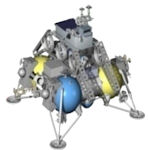Russia - Luna 29
 The launches of the Russian landing vehicles Luna-28 and Luna-29 may be postponed outside the Federal Space Program (FKP) until 2025, TASS was told 16 May 2016 at the Space Research Institute (IKI) of the Russian Academy of Sciences. "The launch of these devices is scheduled for 2024 (Luna-28) and 2025 (Luna-29), but it may go beyond the scope of the current FKP," the Institute said.
The launches of the Russian landing vehicles Luna-28 and Luna-29 may be postponed outside the Federal Space Program (FKP) until 2025, TASS was told 16 May 2016 at the Space Research Institute (IKI) of the Russian Academy of Sciences. "The launch of these devices is scheduled for 2024 (Luna-28) and 2025 (Luna-29), but it may go beyond the scope of the current FKP," the Institute said.
The scientific director of the Space Research Institute of the Russian Academy of Sciences (IKI) Lev Zeleny reported 08 October 2019 to TASS. "The Luna-28 and Luna-29 vehicles are included in the next federal space program, these two projects are planned to be carried out until 2029-2030. Luna-28 is the delivery [to Earth] of lunar soil, Luna-29" "delivery [to the Moon] of a rover with varying degrees of maneuverability and the ability to explore geological samples in situ." the scientist said. He did not name the dates for the Luna-29 mission, since work on planetary rovers is just beginning. "We are planning to cooperate with the German Institute of Robotics in this, negotiations are underway. These rovers should work in two modes - control mode from the ground and in automatic mode," the scientific director of the IKI RAS explained.
The creation of the Luna-29 automatic interplanetary station will be carried out as part of the Federal Target Program (FTP) for a superheavy rocket. Luna-29 is part of a large-scale Russian program for the exploration and development of the Moon. As part of the Luna-29 mission, it is planned to launch an automatic station with a heavy planetary rover on board. The mass of the latter will be approximately 1.3 tons. Funding for the creation of Luna-29 will be carried out not within the framework of the federal space program, but within the framework of the federal target program for a super-heavy class launch vehicle.
The launch of the Luna-29 station is planned to be carried out from the Vostochny cosmodrome using the Angara-A5V launch vehicle with the KVTK oxygen-hydrogen upper stage. The goal of the Russian lunar program is to ensure national interests in the new space frontier. Humanity's interest in the Moon is primarily due to the fact that unique regions have been discovered on the satellite that have favorable conditions for building bases.
As of 2019 Russian specialists were working on the idea of including a robot in the project, which will be used for autonomous control of the lunar rover. The lunar rover for the Luna-29 mission was being developed at the NPO. Lavochkin on the basis of the lander of the Luna-Resource-1 mission. Lunokhod will be used for exploration work, for which it will be equipped with a drilling rig that will allow soil sampling from a depth of up to two meters. In February 2019, NPO Lavochkin was told that the development of the lunar rover is at the stage of research work.
As reported by REGNUM news agency, in November 2018, Dmitry Rogozin, CEO of the state corporation Roscosmos , said that robotic systems would be widely used in the implementation of the Russian lunar program.
As of 2016 the launch was tentatively scheduled for 2028.
????-28
|
NEWSLETTER
|
| Join the GlobalSecurity.org mailing list |
|
|
|

